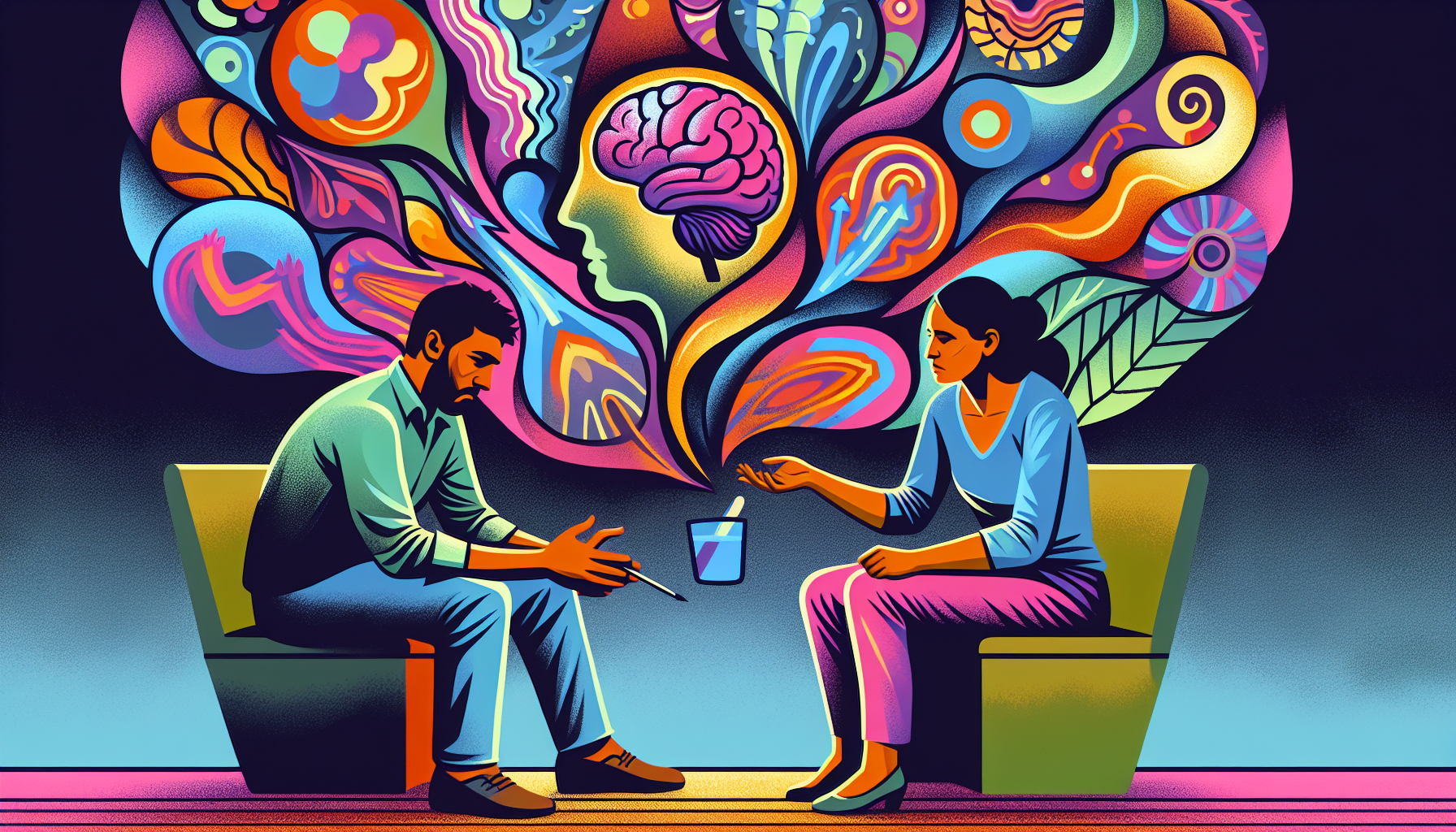Comprehensive Assessment: The First Step to Tailored Treatment
Every individual has a unique path to healing, necessitating the importance of an extensive evaluation to identify each patient’s specific requirements and the intensity of their addiction. Such thorough assessments are essential for deciding on the most appropriate treatment strategy.
Customizing treatment programs to suit personal drug use patterns, as well as related health, psychological, and societal issues, significantly improves chances for successful recovery.
Initial Evaluation
Initiating the journey towards recovery necessitates undergoing a preliminary assessment to seek treatment. This comprehensive evaluation entails a meticulous review of the person’s medical history along with an in-depth conversation about their patterns of substance use. Evaluating the individual’s mental health is vital for a holistic understanding of their requirements.
Diagnostic Testing
As described in the Diagnostic and Statistical Manual, diagnostic testing plays a crucial role in addiction treatment by providing detailed insights into a patient’s recent drug use. Recognizing these usage patterns is vital for designing effective treatment strategies customized to meet the unique requirements of each individual seeking help.
Personalized Treatment Recommendations
Healthcare professionals can create customized treatment recommendations based on information gained from the initial assessment. These suggestions consider the specific details of a patient’s substance use history, allowing for a focused and efficient route toward rehabilitation.
Medically Managed Detoxification: Starting the Journey
Embarking on the path to sobriety often begins with detoxification. This initial stage can be accompanied by difficult withdrawal symptoms, both physical and mental in nature. To ensure safety and alleviate discomfort during this phase, medically managed detoxification is crucial, as it reduces the chance of potential complications when withdrawal symptoms arise.
The process for managing withdrawal symptoms varies based on the substance involved.
- For opioid addiction, buprenorphine and methadone are utilized.
- A gradual reduction in benzodiazepines is implemented for those withdrawing from them.
- Withdrawal from stimulants is addressed using symptomatic medications.
- In cases of severe alcohol withdrawal, medical management may include high doses of diazepam for sedation purposes.
Evidence-Based Therapies for Sustainable Healing
Following detoxification, the critical phase of drug addiction treatment ensues. Continual involvement in proven therapeutic approaches is essential for lasting recovery. These may encompass:
- Behavioral mental health therapy focusing on cognition
- Therapy designed to boost motivation
- Therapeutic interventions involving family members
The goal of these therapies extends beyond merely treating drug addiction. They also tackle any concurrent disorders and provide individuals with the skills necessary for enduring sobriety.
Cognitive Behavioral Therapy
Cognitive behavioral therapy (CBT) is a cornerstone of addiction treatment. It helps individuals understand and modify their thoughts, feelings, and actions related to substance use. Acknowledging how feelings and behaviors lead to substance use equips individuals to overcome their addiction. This involves identifying negative ‘automatic thoughts’ stemming from misconceptions and internalized feelings of self-doubt and fear.
CBT teaches patients new, positive behaviors that replace the negative ones associated with drug or alcohol use. They are also taught to address triggers for substance use through techniques of recognition, avoidance, and coping. A key component of CBT is relapse prevention, which involves strategies such as identifying and coping with high-risk situations, enhancing self-efficacy, and cognitive restructuring to help maintain sustained behavioral changes.

Motivational Enhancement Therapy
Motivational enhancement therapy (MET) represents an essential element of treatment, distinguishing itself by emphasizing the cultivation of motivation as a precursor to change rather than prioritizing immediate abstinence.
MET typically involves four to six sessions. It integrates assessment procedures, establishes objectives, and utilizes motivational interviewing techniques. The aim is for patients to alter their perceptions and ignite a willingness to pursue recovery. MET is guided by the Transtheoretical Model of Behavior Change, which identifies six stages through which individuals progress.
1. Pre-contemplation
2. Contemplation
3. Determination
4. Action
5. Maintenance
6. Relapse
By working within these progressive stages, MET assists clients in navigating their journey toward change effectively.
Family Therapy
Addiction can profoundly impact the family structure, making it essential to include family members in the recovery journey. Engaging in family therapy sessions improves overall familial dynamics and establishes solid support networks, which serve as vital safety nets for those undergoing recovery.
Depending on what each family member needs, therapy sessions might involve all relatives or may be tailored individually. Extensive programs offering such therapeutic services deliver not only support groups but also arrange retreats and educational material specifically designed for families. This assists them significantly in grasping and managing the repercussions associated with addiction.

Embracing Peer Support: The Role of Self-Help Groups
Recovery from a substance use disorder can seem like an isolating experience, yet one doesn’t have to go through it alone. Support networks such as Narcotics Anonymous and Alcoholics Anonymous are notable examples where people come together to lend each other mutual support.
During these group meetings, members often recount their personal battles with addiction, which creates a secure space for others to open up about their own challenges and progress. This environment offers various viewpoints and lived experiences that provide participants with the opportunity to learn new coping mechanisms and insights beneficial in their recovery journey.
Incorporating elements of cognitive behavioral therapy (CBT) within these groups allows individuals the chance to apply learned coping techniques outside of therapy sessions, thereby improving the likelihood of successful recovery.
Navigating Co-Occurring Disorders
Addiction rarely exists in isolation. Often, it co-occurs with other mental disorders, necessitating a comprehensive, integrated treatment approach. Treating co-occurring mental health and substance use conditions together provides a more holistic care approach, acknowledging the complexity and overlap between different conditions.
Integrated treatment combines cognitive behavioral therapy with strategies to improve interpersonal and coping skills. It addresses conditions such as:
- Anxiety
- ADHD
- Bipolar disorder
- OCD
- Eating disorders
- PTSD
Neglecting to treat mental disorders alongside substance use disorders can result in struggles to achieve sobriety and a worsened overall condition. It is crucial to seek assistance for mental health issues to address substance abuse concerns effectively.
Relapse Prevention: Strategies for Maintaining Abstinence
Navigating the path of recovery is an ongoing process that comes with its own set of challenges, including the threat of a relapse. Managing temptations effectively often involves participating in positive activities like exercise or reading. Preventing relapse encompasses behavioral tactics—such as extricating oneself from high-risk scenarios—and cognitive techniques, such as engaging in affirmative self-dialogue.
Recognizing the vital need to acquire new strategies for coping is fundamental to sustained sobriety. Both one’s belief in their ability to succeed (self-efficacy) and expectations about outcomes significantly influence the possibility of relapse and its prevention. Evidence suggests that methods designed to prevent relapses are particularly effective when treating alcohol-related disorders and are enhanced when used alongside pharmacological interventions.
Aftercare and Ongoing Recovery Support
Continued recovery from addiction stretches well beyond the point of initial treatment. It’s an enduring dedication to staying substance-free, which requires persistent support and attention. Aftercare represents the ongoing process of care and assistance provided once primary addiction therapy is concluded, often taking place on an outpatient basis.
In order to be effective, aftercare might encompass strategies such as:
- Engaging in therapeutic sessions
- Managing medications appropriately
- Participation in support groups
- Residing in sober living situations to preserve a drug-free lifestyle
The length of time one spends engaged with aftercare services is tailored individually based on each person’s specific needs and objectives for their treatment plan. To prevent relapse and attain significant progress toward recovery, individuals must approach their aftercare regimen with openness and a strong sense of commitment.
Paramount Recovery Centers: Your Partner in Recovery
At our Massachusetts treatment center, we offer all-encompassing addiction treatment programs that provide the following:
- Day treatment services
- Tailored services for treating addiction
- A holistic and individual-focused methodology
- Catering to specific requirements
The team at our facility is dedicated to supporting you throughout each phase of your path to recovery.
In the journey to recovery, understanding addiction as a chronic disease, undergoing comprehensive assessments, and participating in evidence-based therapies are vital. Embracing peer support and navigating co-occurring disorders enhances the recovery process while maintaining abstinence and accessing aftercare and ongoing recovery support ensure lifelong sobriety. At our drug addiction treatment center, we stand beside you, offering specialized addiction treatment services every step of the way.
Frequently Asked Questions
What is the first step towards recovery from addiction?
To embark on the path to overcoming addiction and drug abuse problems, it is essential to perform a thorough assessment and preliminary evaluation. This initial step aims to grasp the individual needs of the patient as well as gauge the intensity of their addiction, which plays a vital role in establishing an appropriate treatment strategy.
How does medically managed detoxification work?
Utilizing specific medications or tapering doses, medically managed detoxification ensures a safe and comfortable withdrawal from addictive substances by employing customized strategies for each particular substance.
What are some examples of evidence-based therapies used in addiction treatment?
In the treatment of alcohol and drug addiction, certain therapies grounded in scientific research are employed, which include CBT, MET, and family counseling. These approaches aim to tackle not only addiction but also accompanying disorders, with a focus on achieving sustained recovery.
What is the role of self-help groups in addiction recovery?
Self-help groups are instrumental in the recovery process from addiction, offering a nurturing atmosphere where people can exchange personal stories and learn various coping mechanisms drawn from a wide spectrum of viewpoints and life experiences, which aids them on their path to recovery.
What is aftercare in the context of addiction recovery?
In the realm of addiction recovery, aftercare refers to ongoing treatment and support mechanisms that follow the completion of an initial phase of addiction treatment. This typically involves outpatient services such as participating in therapy sessions, managing medications, attending support groups, and residing in sober living environments to ensure sustained sobriety.



